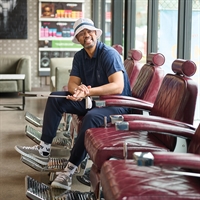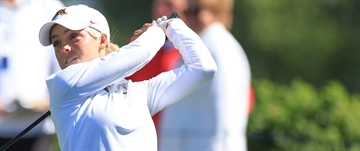Warian Is Medalist & Gophers Are Team Champs at Highland Meadows
April 16, 2024
Not every golfer remembers the moment they became captivated by the game, but business owner and self-made creative entrepreneur and cultural architect Houston White does. A native of Mississippi, White moved to North Minneapolis with his mother as a youngster and grew up admiring Greg Norman (“this tall white dude with a cowboy-looking hat”). He tried out for his high school golf team, struggled mightily for a month and then quit the game. Until the 1997 Masters Tournament.
“I hadn’t seen any of Tiger Woods’ junior golf, so I didn’t know who he was,” White says. “I started watching the ‘97 Masters and Tiger had the red on, and I was like, ‘there’s a Black dude playing golf. OK, I kind of like that.’
“I watched Saturday and Sunday, and it was just Tiger with his dad. Earl [Woods] could have been my uncle, my dad, my granddad. It looked like these were real Black people, and this dude is dominating! So, as soon as Tiger hugged his dad, I got up and went straight to the driving range.”
White grabbed a two-iron and a bucket of balls at the range and got to work. He said he scared some people hitting that ill-advised two-iron all over the place, until a gentleman walked over and asked, “Do you want to learn golf?” And White answered, “Yeah, I really do.”
“I started going to the range every day,” White says. “Then over the course of 1999-2000, I took over 84 golf lessons. I was all in. I kept a journal, and it showed my earliest score of 162. A year later I had a 121 and a couple months later I’m in the 90s—you’d see the progression from all the work. I became obsessed.”
It was the beginning of a love affair with golf for White that continues today. He’d discovered a passion for the game, and with persistence and drive—characteristics he has demonstrated all his life—launched a successful business career that utilizes golf to help others uncover their passions, abilities and potential way forward.
Early Entrepreneur
White developed his entrepreneurial spirit early in life. While in Mississippi, he was surrounded by it in his own family. His father—later assisted by Houston during the summers—rehabbed homes. His grandma made cakes and sold them. His grandfather had a small engine repair business. And young Houston followed suit.
“All of my family were entrepreneurs,” he says. “I grew up seeing people make stuff and be creative. It was about more than just making stuff, it was about making stuff and doing commerce. So, when I was 7, I started my first business.”
White created his own “lawn hacking service.” His grandfather gave him a couple old lawnmowers, and Houston hired his cousins to cut wild grass fields under the hot summer sun. White would collect money from the field owners and buy candy to pay his cousins.
“That’s how I got started,” White says. “And once you start enterprising, it’s like that lightbulb went off for me, and I was hooked.”
At around age 13, White began cutting his friends’ hair at $2 per cut (increasing that to $20 when he was 16). He then started screen printing and selling t-shirts—saving money for his next move.
“I was trying to find ways to enterprise and hustle legally,” he says. “You don’t always want to go ask your mom for money. You get tired of people saying no.”

Fashion Forward
While White grew his business empire (which included The Get Down Coffee Co. brand—now available in Target stores—and, in 2012, a clothing line called Black Excellence), he was also working on his golf game, and the two began to intertwine. He played golf as often as possible (ultimately achieving a 2 handicap) and with whoever arrived on the first tee—to the benefit of his game and his business.
“I learned the concept of leverage on the golf course by listening to older guys talking about trusts and stocks, and thinking about how I should be leveraging my money,” White says. “I’m out there for four hours with knowledgeable people, uninterrupted. I was being mentored by folks from every walk of life on the golf course.”
For White, golf was an opportunity to make connections and learn something new. “I am forever remaining coachable in business and in life, and that’s why I am able to do so much,” he says. “Never think you have arrived, and you will keep arriving.”
The time had arrived, however, to leverage golf in his business—and make it culturally relevant. White added the Viictory Line of golf apparel to his fashion business. He’d met a woman from the Ivory Coast who could manufacture White’s vision of Kente cloth African wear for the golf course. The clothing has been featured at the 3M Open tournament in Blaine.
“It all started with that idea of just wanting representation and wanting my culture celebrated,” White says.
Mixed Four-Ball
While the COVID-19 pandemic tempered Viictory Line’s launch in 2020, it was the impetus for White’s next venture: the “Be the Change” golf tournament at Theodore Wirth GC.
“The tournament originated from the idea of ‘What can I do that I love to help my neighborhood, my community?’” White says. “All the rec centers were closed down in the neighborhood during the pandemic, and we had a big problem with the kids getting in trouble. There wasn’t anything for them to do.
“With the pandemic-induced recession going on, the smaller nonprofits trying to do good work couldn’t get funding,” White says. “And with the race conversation and polarization in our politics [at the time of George Floyd’s death], we needed to get people together to build richer and deeper relationships. We needed to raise money for these nonprofits so they don’t go out of business, and we wanted to give these kids a shot.”
For White, the relationship-building began on the first tee of the tournament, where the foursomes are not pre-ordained. For the Be the Change event, you can register as a single, twosome or threesome, but not a foursome—each group is filled out by the tournament staff.
“We’re going to pick the fourth so that we can spark conversations,” White says. “For the Houston White brand ethos, we live by two things: human connection is the most powerful force in nature, and we need a more intercultural world—and we do that by creating these cultural collisions. People who would not normally meet up and connect can find so much in common across the sport that we play. The results have been overwhelming.”
White tells stories of connections made at the tournament that continue to flourish. But the bottom line is that more than $200,000 was raised in the first two years of the event. The nonprofits benefitting from the tournament include the youth sports programs at Heritage Sports Foundation, which is joining forces with The First Tee; A Mother’s Love Initiative, an outreach program for mothers affected by gun and domestic violence; the JB Foundation, a youth mentorship organization; and Sprayfinger, a youth arts organization that the tournament supported by recently funding an immersive arts trip to Chicago for 15 kids.
“Golf has been the most valuable tool, in the top two or three, to get where I am in business and in life,” says White.
Model Behavior
White’s barber/coffee shop is not filled with golf paraphernalia, but on any given day, it buzzes with activity and commerce. His business is centered in a Camden community hub, across Humboldt Avenue from a Hennepin County Library branch and a food market. And as the business grows and his brand scales, White wants to ensure that North Minneapolis, the place that made him, gets the benefit—and that young people witness it.
“It’s cultural representation,” he says. “It’s like moms showing their kids my videos and saying, ‘Look, Houston plays golf.’ Any number of youngsters send me videos and say, ‘I signed up for The First Tee!’ It’s been super organic, but I see what’s happening with The First Tee, and the Heritage Foundation is growing by leaps and bounds.”
So, then is White, like Woods, a community role model?
“I would argue that role model is not the right term. It’s more like inspiration,” he says. “I’m finding that when I do what I do, people are inspired. They’re like, ‘Well, he’s doing it and he looks like me.’ Or ‘He came from where I came from.’ So, you can see yourself in that person and it inspires you to act. It’s culturally relevant.”

April 9, 2024
Contact Us
Have a question about the Minnesota Golf Association, your MGA membership or the contents of this website? Let us help.